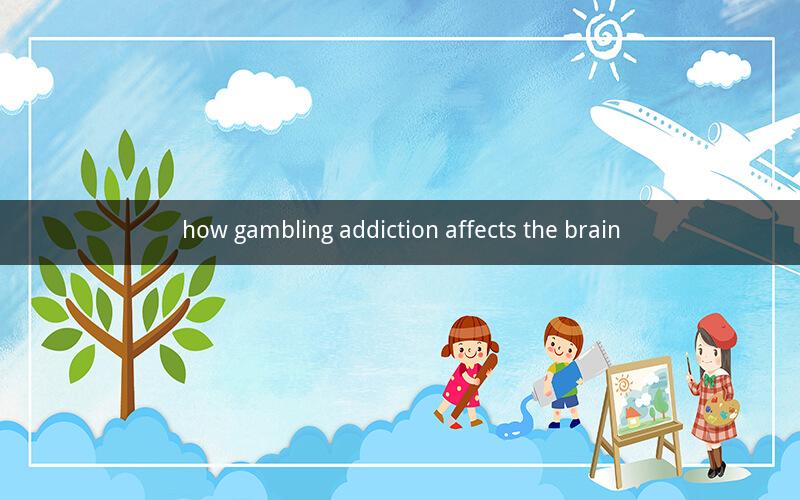
Table of Contents
1. Introduction to Gambling Addiction
2. The Science Behind Brain Chemistry and Gambling
3. Dopamine and the Reward System
4. The Role of the Prefrontal Cortex
5. The Impact of Chronic Gambling on the Brain
6. Cognitive and Emotional Changes
7. Neuroplasticity and Recovery
8. Treatment and Intervention Strategies
9. Conclusion
1. Introduction to Gambling Addiction
Gambling addiction, also known as problem gambling, is a complex disorder that affects millions of people worldwide. It is characterized by an inability to control gambling behavior, despite negative consequences. Understanding how gambling addiction affects the brain is crucial in developing effective treatment and prevention strategies.
2. The Science Behind Brain Chemistry and Gambling
The brain is a highly complex organ that is influenced by various chemicals and neurotransmitters. When a person engages in gambling, the brain releases dopamine, a neurotransmitter associated with pleasure and reward. This release of dopamine creates a sense of euphoria and reinforces the desire to continue gambling.
3. Dopamine and the Reward System
The reward system in the brain is responsible for reinforcing behaviors that are beneficial to survival. When a person wins a bet while gambling, the brain releases dopamine, reinforcing the behavior. Over time, this can lead to the development of a compulsive gambling disorder, as the brain becomes more sensitive to the rewards associated with gambling.
4. The Role of the Prefrontal Cortex
The prefrontal cortex is a region of the brain involved in decision-making, impulse control, and judgment. When a person is addicted to gambling, the prefrontal cortex is often impaired, leading to difficulties in making rational decisions and controlling impulsive behaviors.
5. The Impact of Chronic Gambling on the Brain
Chronic gambling can have a significant impact on the brain, leading to changes in structure and function. These changes can include:
- Dopamine Receptor Hypersensitivity: The repeated release of dopamine during gambling can lead to the downregulation of dopamine receptors, making the brain more sensitive to the substance.
- White Matter Changes: Chronic gambling can lead to changes in white matter, the protective covering of nerve fibers, which can affect communication between brain regions.
- Cognitive Impairment: Impaired cognitive function, such as memory and attention, can occur due to changes in brain structure and function.
6. Cognitive and Emotional Changes
Gambling addiction can also lead to significant cognitive and emotional changes, including:
- Increased Risk of Depression and Anxiety: The stress and anxiety associated with gambling can lead to the development of depression and anxiety disorders.
- Impaired Social Functioning: Compulsive gambling can lead to strained relationships with family and friends, as well as job loss and financial difficulties.
- Cognitive Impairment: Memory, attention, and decision-making skills can be affected due to changes in brain structure and function.
7. Neuroplasticity and Recovery
Neuroplasticity is the brain's ability to change and adapt throughout life. This means that even after years of gambling addiction, the brain can recover and improve its function. Treatment and intervention strategies that promote neuroplasticity can help individuals overcome their addiction and improve their quality of life.
8. Treatment and Intervention Strategies
Several treatment and intervention strategies can help individuals overcome gambling addiction, including:
- Cognitive Behavioral Therapy (CBT): CBT focuses on identifying and changing negative thought patterns and behaviors associated with gambling addiction.
- Medication: Certain medications, such as naltrexone and topiramate, have been shown to reduce the urge to gamble.
- Support Groups: Support groups, such as Gamblers Anonymous, can provide individuals with a sense of community and support.
9. Conclusion
Understanding how gambling addiction affects the brain is crucial in developing effective treatment and prevention strategies. By addressing the underlying brain chemistry and cognitive changes associated with gambling addiction, individuals can overcome their addiction and lead healthier, more fulfilling lives.
Questions and Answers
1. Q: What is the primary neurotransmitter involved in the reward system of gambling?
A: Dopamine is the primary neurotransmitter involved in the reward system of gambling.
2. Q: How does chronic gambling affect the prefrontal cortex?
A: Chronic gambling can impair the prefrontal cortex, leading to difficulties in decision-making, impulse control, and judgment.
3. Q: What are some cognitive and emotional changes associated with gambling addiction?
A: Cognitive changes include memory, attention, and decision-making impairments, while emotional changes include increased risk of depression and anxiety.
4. Q: How can neuroplasticity help individuals overcome gambling addiction?
A: Neuroplasticity allows the brain to change and adapt, which can help individuals overcome their addiction by improving cognitive and emotional function.
5. Q: What are some treatment and intervention strategies for gambling addiction?
A: Treatment and intervention strategies include cognitive behavioral therapy (CBT), medication, and support groups.
6. Q: How can dopamine receptor hypersensitivity contribute to gambling addiction?
A: Dopamine receptor hypersensitivity can make the brain more sensitive to the rewards associated with gambling, reinforcing the behavior.
7. Q: What is the role of white matter changes in chronic gambling?
A: White matter changes can affect communication between brain regions, leading to cognitive impairments.
8. Q: How can support groups help individuals overcome gambling addiction?
A: Support groups provide individuals with a sense of community and support, making it easier to overcome their addiction.
9. Q: What is the impact of gambling addiction on social functioning?
A: Gambling addiction can lead to strained relationships with family and friends, as well as job loss and financial difficulties.
10. Q: How can medication help in treating gambling addiction?
A: Medications such as naltrexone and topiramate can reduce the urge to gamble and help individuals manage their addiction.